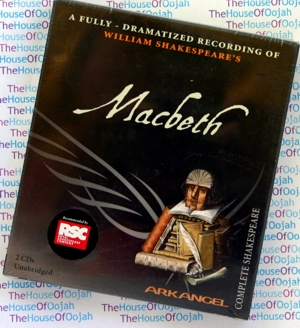MacBeth by William Shakespeare - Dramatised Audio CD Unabridged

MacBethby William ShakespeareA fully dramatised recordingGet other William Shakespeare plays on Audio CD click hereGet Other Classic Audio Books CD click here |
 |
MacBeth by William Shakespeare - Unabridged Audio CDBrand New : Unabridged 2 Audio CDs 2.1 Hours The first act of the play opens amidst thunder and lightning, with the Three Witches deciding that their next meeting shall be with Macbeth. In the following scene, a wounded sergeant reports to King Duncan of Scotland that his generals Macbeth, who is the Thane of Glamis, and Banquo, have just defeated the allied forces of Norway and Ireland, who were led by the rebel Macdonwald. Macbeth, the King's kinsman, is praised for his bravery and fighting prowess. The scene changes. Macbeth and Banquo enter, discussing the weather and their victory ("So foul and fair a day I have not seen"). As they wander onto a heath, the three Witches, who have been waiting, greet them with prophecies. Even though it is Banquo who first challenges them, they address Macbeth. The first hails Macbeth as "Thane of Glamis", the second as "Thane of Cawdor", and the third proclaims that he shall "be King hereafter". Macbeth appears to be stunned to silence, so again Banquo challenges them. The Witches inform Banquo he shall father a line of kings, though he himself will not be one. While the two men wonder at these pronouncements, the Witches vanish, and another Thane, Ross, a messenger from the King, arrives and informs Macbeth of his newly bestowed title—Thane of Cawdor. The first prophecy is thus fulfilled. Immediately, Macbeth begins to harbour ambitions of becoming king. Macbeth writes to his wife about the Witches' prophecies. When Duncan decides to stay at the Macbeths' castle at Inverness, Lady Macbeth hatches a plan to murder him and secure the throne for her husband. Although Macbeth raises concerns about the regicide, Lady Macbeth eventually persuades him, by challenging his manhood, to follow her plan. On the night of the king's visit, Macbeth kills Duncan. The deed is not seen by the audience, but it leaves Macbeth so shaken that Lady Macbeth has to take charge. In accordance with her plan, she frames Duncan's sleeping servants for the murder by planting bloody daggers on them. Early the next morning, Lennox, a Scottish nobleman, and Macduff, the loyal Thane of Fife, arrive.[1] The drunken porter opens the gate and Macbeth leads them to the king's chamber, where Macduff discovers Duncan's corpse. In a feigned fit of anger, Macbeth murders the guards before they can protest their innocence. Macduff is immediately suspicious of Macbeth, but does not reveal his suspicions publicly. Fearing for their lives, Duncan's sons flee, Malcolm to England and his brother Donalbain to Ireland. The rightful heirs' flight makes them suspects and Macbeth assumes the throne as the new King of Scotland as a kinsman of the dead king. Despite his success, Macbeth remains uneasy about the prophecy about Banquo. So Macbeth invites him to a royal banquet and discovers that Banquo and his young son, Fleance, will be riding out that night. He hires two men to kill them. A third murderer appears mysteriously in the park before the murder. While the assassins kill Banquo, Fleance escapes. At the banquet, Banquo's ghost enters and sits in Macbeth's place. Only Macbeth can see the spectre; the rest panic at the sight of Macbeth raging at an empty chair, until a desperate Lady Macbeth orders them to leave. Macbeth, disturbed, goes to the Witches once more. They conjure up three spirits with three further warnings and prophecies, which tell him to "beware Macduff", but also that "none of woman born shall harm Macbeth" and he will "never vanquish'd be until Great Birnam Wood to high Dunsinane Hill shall come against him". Since Macduff is in exile in England, Macbeth assumes that he is safe; so he puts to death everyone in Macduff's castle, including Macduff's wife and their young children. Lady Macbeth becomes racked with guilt from the crimes she and her husband have committed. In a famous scene, she sleepwalks and tries to wash imaginary bloodstains from her hands, all the while speaking of the terrible things she knows. In England, Malcolm and Macduff are informed by Ross that "your castle is surprised, your wives and babes savagely slaughtered." Macbeth, now viewed as a tyrant, sees many of his thanes defecting. Malcolm leads an army, along with Macduff and Englishmen Siward (the Elder), the Earl of Northumberland, against Dunsinane Castle. While encamped in Birnam Wood, the soldiers are ordered to cut down and carry tree limbs to camouflage their numbers, thus fulfilling the Witches' third prophecy. Meanwhile, Macbeth delivers a famous soliloquy ("Tomorrow, and tomorrow, and tomorrow") upon his learning of Lady Macbeth's death (the cause is undisclosed, and it is assumed by some that she committed suicide, as Malcolm's final reference to her reveals "'tis thought, by self and violent hands / took off her life"). A battle culminates in the slaying of the young Siward and Macduff's confrontation with Macbeth. Macbeth boasts that he has no reason to fear Macduff, for he cannot be killed by any man born of woman. Macduff declares that he was "from his mother's womb untimely ripp'd" (i.e., born by Caesarean section) and was therefore not "of woman born". Macbeth realizes, too late, the Witches have misled him. Macduff beheads Macbeth off stage and thereby fulfills the last of the prophecies. Although Malcolm is placed on the throne and not Fleance, the witches' prophecy concerning Banquo, "Thou shalt [be]get kings", was known to the audience of Shakespeare's time to be true, for James I of England was supposedly a descendant of Banquo.
About the Author William Shakespeare (baptised April 26 1564 - died April 23 1616) |
MacBeth by William Shakespeare - Unabridged Audio CD |

 0 Items (Empty)
0 Items (Empty)
